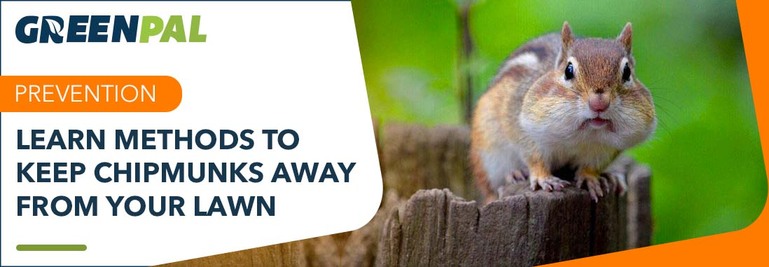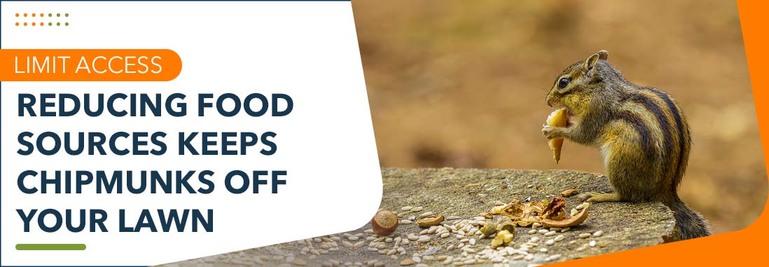How to Get Rid of Chipmunks in Your Lawn
Like moles and voles, chipmunks possess the digging itch needed to create quite a ruckus on your lawn and in your garden. They're ground-dwelling squirrels, though. They're fast. If you're looking to figure out how to get rid of chipmunks in your lawn, this guide will help.
We'll talk about chipmunks, their habits, and how to make sure they don't tear up your lawn or garden.
Key Takeaways:
Chipmunk Damage: Chipmunks dig holes, destroy gardens, and scatter birdseed, making lawns unsightly. |
Humane Repellents: Repellents and yard modifications, like trimming plants and securing food, can keep them away. |
Trapping: Live traps with bait such as seeds or peanut butter help catch and relocate chipmunks. |
Preventive Measures: Keep your yard tidy, seal burrows, and store food properly to prevent chipmunks from returning. |
Professional Help: For severe infestations, call pest control for efficient removal. |
Understanding the Problem: Why Chipmunks Are a Nuisance

Chipmunks can turn your yard into an eyesore in days if left unchecked. Many find them cute. But their digging and gnawing can make your yard look worse for wear. A solid understanding of chipmunks and the damage they cause is the first step in keeping them from damaging your lawn.
The signs of damage for a chipmunk are more subtle than a mole, but there are some clues that they're the issue. Outside of seeing them running across your lawn (they are a squirrel species), here are a few of the ways you can tell if a chipmunk is the culprit for yard and garden damage:
A chipmunk's holes: Small, quarter-sized holes in your lawn or garden are sure signs of a chipmunk. These tunnels are used for nesting and are typically a couple of inches wide.
Messy bird feeders: If you have bird feeders, you might notice scattered seeds and piles (as well as an increase in seed consumption). Chipmunks are attracted to the easy food source. They'll stuff their cheeks full, retreat, and do it all again — causing quite a mess. If you see any of these signs, you probably have a chipmunk.
Garden damage: Chipmunks don't hold back when they get a hold of plants they like. They dig to find flowering bulbs. A chipmunk is likely to blame if you see tiny claw marks next to damaged plants.
Droppings and tracks: It can be hard to notice the droppings and tracks of a chipmunk. Their droppings may be confused with mice droppings. They have blunted ends and are dark and cylindrical. The tracks are hard to find but easy to identify. According to the Missouri Department of Conservation, chipmunks have a gait that leaves their hind track heel indistinct or unprinted. Tracks usually appear in four clusters, "with (their) front feet positioned behind and between hind feet, and one front foot usually behind the other."
How to Get Rid of Chipmunks Humanely

There are many humane ways to get rid of chipmunks. Humane methods focus on deterrents – items that drive out chipmunks without harming them — and habitat modification — making your yard less welcoming to chipmunks in the first place.
Repellents and Deterrents
There are many claims about repellents for pests. Everything from essential oils to hot peppers float around as effective repellents for chipmunks. It's important to know that many of these repellents are unverified claims and not considered a reliable means to keep chipmunks at bay by pest control experts. Regardless, the following repellents have been found to work in some cases.
Moth flakes and moth placed in confined spaces may discourage chipmunks from attics and other crawl spaces they may find suitable for nesting. Repellents containing ammonium, Bitrex, and thiram sprayed on flower bulbs, vegetation, and seeds effectively keep chipmunks away. Soaps and fatty acids help as well. Many of these products are unsafe for pets and children — so exercise caution.
RELATED: Protecting Your Pet: The Importance of Pet Safe Lawn Fertilizers
Habitat Modification
Modifying your yard to eliminate things that attract chipmunks is one of the best methods to reduce their activity. First, if you're looking for the most humane way to keep chipmunks in the forest and out of your yard, be careful about how and where you place food in your yard.
Are you putting out a lot of birdseed?
Cut back or stop altogether if you're facing a chipmunk infestation. You can also try ways to chipmunk-proof your bird feeders or buy a feeder built to keep critters out. Some things to look for are weight-activated shields that close feeder access when a larger pest hops on. They might also have tighter lids and technology to stay intact when shaken.
Chipmunks are highly motivated by food. Store pet and bird food wisely.
Also, keep your shrubs and plants trimmed to the ground. Overgrown vegetation gives chipmunks places to hide. Seal up burrows or other possible entrances to your yard so chipmunks don't have a place to set up a home. Store firewood off the ground as well. Chipmunks love hiding spots, so it's important to eliminate their opportunities.
The simplest and most effective deterrent is maintaining your yard by keeping it trimmed and tidy with regular lawn care, such as mowing, trimming, and removing debris. Check for holes or cracks in your home's foundation, siding, or roofline. Chipmunks can pass through surprisingly small areas, so seal up cracks with caulk, expanding foam, or wire mesh. If your home has a crawl space or basement, block those areas to prevent chipmunks from nesting there.

How to Get Rid of Chipmunks Using Traps
Trapping chipmunks is often an effective way of dealing with a chipmunk infestation, especially if repellents and deterrents aren't doing the trick. Live traps can catch and remove chipmunks and can be used to safely relocate the creatures out of your lawn where they won't return.
There are different traps, but homeowners often seek out live traps since they're more humane. These are usually small wire cages that spring closed when a chipmunk goes in and can be removed unharmed. Check your traps often to be sure the animal is released quickly and not stressed or dehydrated.
It's easy to use live traps:
1. Set up the trap near where you've seen burrows or chipmunks running around. |
2. Bait it with something chipmunks like – peanut butter, sunflower seeds or cracked corn will all work well. |
3. Release the animal in a wooded area away from your home. A few miles should work well so it can't come back to bother you. |
The Best Baits for Chipmunk Traps
Bait is a simple, inexpensive way to lure chipmunks out of their burrows and into traps. If you're using a live trap, it's important to use bait that chipmunks will be attracted to while not causing a huge mess in your yard. As we mentioned earlier, chipmunks love food.
Here are a few of their favorite foods that work as baits:
|
|
|
|
|
|
|
If you're not using a trap, it's essential that the bait does not attract other animals you'd rather not have around. Check bait stations regularly and remove leftover food to avoid attracting other pests.
Once you've removed the pest, monitor your yard for new chipmunk activity. When you see fresh burrows or gnaw marks, you have a problem — time to break out the trap and bait.

When to Call a Professional to Get Rid of Chipmunks
Chipmunks are territorial. It's rare to face an infestation; it's even less likely that they will cause any structural damage. Mainly, homeowners want them gone since they tear up gardens, so for some, it may be worth calling a professional.
If chipmunks have gotten into your attic or basement, it's best to promptly take care of the issue. A pest control or wildlife management expert can provide the best solution. They'll set professional-grade traps or barriers and handle the relocation or extermination of the chipmunks. Removing the chipmunks may take a few visits, so get a quote in advance to know how much it will cost and how long it could take.
Frequently Asked Questions
Do chipmunks carry diseases?
Yes. Chipmunks pose a health risk since they carry zoonotic diseases, meaning they can pass their diseases to humans. A few of the diseases they carry are Lyme disease, ticks, and a bacterial disease known as plague.
Do chipmunks damage property?
While extensive property damage is rare and limited to large infestations, chipmunks burrow. Their burrowing and gnawing habits mean that they can cause property damage.
Are chipmunks bad to have around?
Chipmunks are a nuance, and many consider them pests. The main threat they pose is the diseases they carry. They also wreak havoc in gardens and on bird feeders.

Should I get rid of chipmunks around my house?
One of the best and most humane ways to keep chipmunks off your lawn is to limit their access to food sources.By properly storing pet food and bird seed and using other practices to eliminate their access to food, chipmunks are less likely to stick around. Repellents and traps can work to get rid of chipmunks, too.

Quick Summary
Aspect |
Details |
Signs of Chipmunk Activity |
- Small, quarter-sized holes in the lawn - Scattered birdseed around feeders - Damaged plants, especially bulbs - Small, cylindrical droppings and subtle tracks |
Humane Removal Methods |
1. Repellents: Ammonium, Bitrex, thiram sprays. 2. Deterrents: Moth flakes, soaps, and fatty acids in crawl spaces. 3. Habitat modification: Reduce food sources, trim vegetation, and seal burrows. |
Effective Traps |
- Use live traps with peanut butter, sunflower seeds, or cereal as bait. - Check traps frequently and release chipmunks far from home (a few miles). |
Preventative Measures |
- Eliminate food sources: Store pet food and bird seed properly. - Chipmunk-proof bird feeders: Use weight-activated shields and tight lids. - Trim and maintain the yard to remove hiding spots. |
Best Baits for Traps |
Sunflower seeds, pumpkin seeds, prune slices, cereal, peanut butter, nutmeats, and raisins. |
When to Call a Professional |
If chipmunks invade attics or basements, hire pest control to set traps, barriers, or handle removal. |
Chipmunks are pests that love to eat. They can be persistent and difficult to control. While it's rare for chipmunks to cause structural damage to a home, they can destroy gardens and leave lawns looking torn up. Traps and repellents help prevent them. Prevention is just as important as removal.
Limiting a chipmunk's food sources and buying bird feeders that keep pests out also helps. You can prevent chipmunks from returning by making your yard less hospitable and dealing with problems as they arise.





 Share
Share











